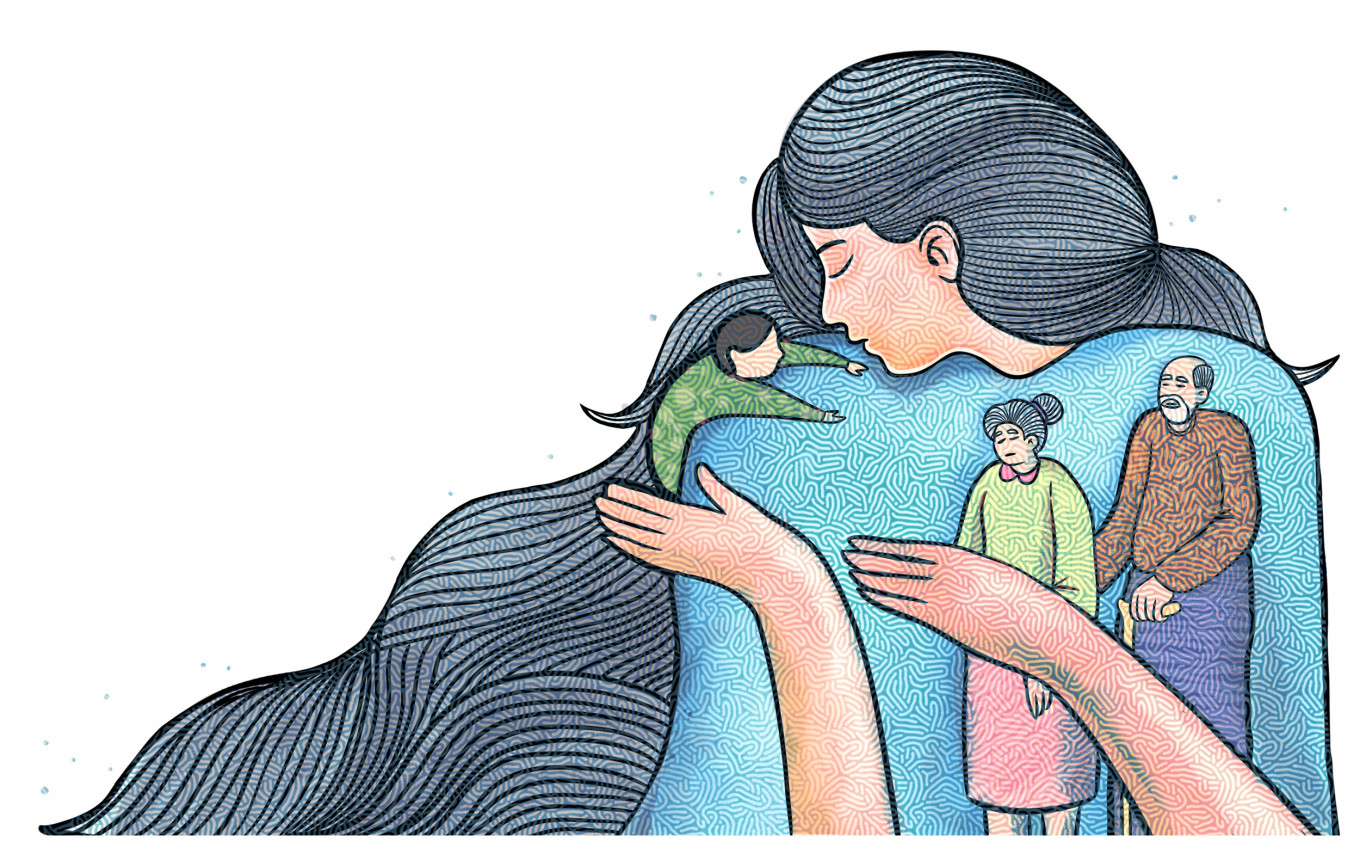100 hours of unpaid work a week
Women can spend more than 100 hours per week on unpaid care work. Magdalene’s social experiment estimates that women could double their salary if caregiving work was a paying job.
Change Size
 (Courtesy of The Jakarta Post)
(Courtesy of The Jakarta Post)
F
ood delivery worker Natalia, 43, drove her motorcycle through South Jakarta’s crowded streets to make sure she arrived on time at a customer's apartment complex. It was a hot and humid afternoon, yet she had to bring her two-year-old child with her as she made her deliveries.
She has no choice. Her husband works as a cook in a restaurant, while her mother takes care of their second child and manages a small shop. For the mother of three, hiring a babysitter or asking help from family members is not an option.
"Yes, I take my child with me. I’ve been holding him on a motorcycle since he was a baby. When he was still breastfeeding, he would cry at the red lights asking for milk," Natalia told Magdalene.
As a part-time food delivery worker, she earns less than Rp 500,000 (US$31.80) per month. She cannot put in more hours as she also has to look after their youngest child, make sure there is food on the table, clean the house, do laundry and more. Juggling the roles of a mother, housewife and a worker leave her with almost no time to think about herself.
"I always wake up feeling extremely exhausted. Sometimes, I just leave the house as a mess because I'm so tired,” she said. “But who would believe me if I said I was tired?”
For Natalia, complaining does not solve her problems – she simply has no other option.
The same sentiment was echoed by four other women who, like Natalia, recently participated in a social experiment conducted by Magdalene in collaboration with the International Labour Organization (ILO) Indonesia.
For seven days, the women recorded their domestic and caregiving tasks on their mobile phones, then noted the time spent on each. The experiment attempted to understand how many hours women spent on caregiving work, an unpaid job deeply associated with women, and its value if it were paid.
Care or caregiving work encompasses all tasks aimed at meeting the needs of others, including parents, children, the elderly and people with disabilities. Despite its crucial importance and substantial productivity value, caregiving work is often not acknowledged as productive work that contributes significantly to the economy. This is because caregiving work is perceived as low-skilled work for women.
Caregiving hours exceed paid work hours
Four out of five participants in Magdalene’s experiment recorded caregiving hours exceeding 40 hours per week, exceeding the standardized total working hours of a full-time worker as stipulated under the Job Creation Law No. 11/2020.
Magdalene then estimated how much they would earn if they were paid for doing the caregiving work, using their income from their current or last paying job. Our findings show that their caregiving work is worth more than their current or last paying job.
For example, Natalia contributed 103.58 hours per week or 414.33 hours per month as a caregiver. That means she would earn Rp 23 million a month from her caregiving work, or 46 times her current income from delivering food, if it was a paying job.
Riris, 53, a retiree who takes care of her bed-bound father 24/7, worked 103.50 hours per week or 414 hours per month. She receives no assistance in doing this work almost 24/7. Her workload equated to 258.75 percent of her last salary.
Emmy, 39, is a single mother who works as a researcher while raising a child and caring for her aging father. She spends 99 hours per week or the equivalent of 396 hours per month as caregiver. Even though she delegates 63.42 hours of caregiving work to a domestic assistant, she still spends 35.58 hours per week, which would give her twice her salary as a social researcher.
Meanwhile, working mother of two Arniati, 35, recorded her caregiving work hours at 50.92 hours per week or the equivalent of 203.67 hours per month. If Arni received a salary for the unpaid caregiving work, her salary would reach almost Rp 11 million per month, more than her current pay.
Ernawati's situation was slightly better than the other four participants’, though not ideal. The 49-year-old travel agent, who has been working from home to care for her ailing father, spends 25.98 hours per week on caregiving work, including taking care of her father for a month. She would have earned 64.69 percent more than her current salary as a caregiver.
These results affirm the ILO’s findings in 2018, which stated that many developing countries had citizens who were overburdened with caregiving work. In the 64 countries that were the focus of the research, unpaid caregiving work totaled 16.4 billion hours. This figure is equivalent to 2 billion people working eight hours a day.
Natalia spends 103.58 hours per week or 414.33 hours per month on caregiving work. That means she would earn Rp 23 million a month from her caregiving work, or 46 times her current income from delivering food, if it were a paying job.
A woman’s role?
The five research participants all agree that caregiving work was important, had economic value but was burdensome. However, they also believed that caregiving work was women’s work, not men's, because women do a better job at nursing others, thus reinforcing the gender bias around this work.
"Sometimes at home, I intentionally don't ask for help. I let my husband take the initiative. But as a male, he's still not very sensitive,” explained Arni. “He does help occasionally. But when he sweeps, it's not clean […] Sometimes he washes the dishes, but needs to be reminded to do it properly. He's asked to help hang laundry, but it's not done the way it should be. When I complain, he would reply, 'You're lucky you have help.’"
Natalia admitted that although she had asked her husband for help around the house several times, she continued to feel unsupported. “Even if I get help, I don't expect the results to be 100 percent the same.”
In Indonesia, children are seen as investments or assets. Bound by this social construct, a child should care for their elderly parents as a form of respect and obligation.
"I seek blessings and worship, so I just say Bismillah [in God’s name] I take care of my father alone […] When exhausted, in the bathroom, I cry until I am breathless. I cry my heart out, then I go back to caring for my father. I have a child. So, whatever I do for my father, I hope my child will learn from me and treat me the same way,” Riris said.
It is worse for an unmarried child. Rosa Diniari, a sociology lecturer at the University of Indonesia (UI) told Magdalene, "If a child is married, they may not be able to fully support their parents because they have their own family to support. But if they're single, who else would be expected to take responsibility for their parents?"
It is an expectation drilled into Indonesians’ minds about the role of women and men in the family: while Budi’s father works in the office, his mother cooks and cleans the house.
No support, no back up
"Once, while nursing my baby, I forgot that I hadn’t eaten,” said food delivery driver Natalia. “I only realized that I was feeling dizzy and shaky when standing up. I didn't even have time to eat, let alone comb my hair and reapply lipstick.”
Travel agent Erna also said she could not expect help from anyone to maintain her physical and mental health, much less government support. Instead, she learns from YouTube about her father's illness.
"I hope the government can help provide a senior-friendly home, because it’s still hard to find carers who truly understand the psychology of the elderly – not just nurses who clean up dirt,” Erna said. "At the very least, I will feel more at ease knowing that my parents are cared for by the right people, with affordable access to their care," she added.
Arni, a working mother, hopes for more support from her husband. She often goes on social media and chats with fellow mothers for support. "If I work late then complain about being tired, my husband tells me, 'Just deal with it and enjoy it, that's the risk of being a working mom.' But what I want is a more equal distribution of tasks because they are our children,” she said.
Single mother Emmy, on the other hand, believes that any form of support is needed. "I think recognition of care work is very important. As a researcher, I am often exposed to campaigns about gender equality and care work. At the end of the day, this work still can’t be ignored. The message is clear – this is not only the responsibility of women.”
Appreciating care work
Early Dewi Nuriana, program coordinator of Caregiving Economy at the ILO, said the first step to addressing this gender bias was by acknowledging that caregiving work was productive work.
"If we already acknowledge or recognize this, then whoever does caregiving work needs to be appreciated. They need to receive incentives For example, mothers should get maternity leave and full pay. Childcare duties should not only be assigned to women but also to men. This duty should be distributed equally, not dumped on women," said Early.
But recognizing the financial value of caregiving work is not easy, she said. That is why it requires continuous steps from various parties, including the government, to change people’s mindsets. Favorable policies should also be at the forefront to accommodate caregivers by giving them financial protection and appreciation.
Infrastructure support can also alleviate the burden carried by caregivers. Facilities such as senior-friendly homes or affordable childcare services can be accessible to both formal and informal workers.
In terms of protecting caregivers, ILO Convention No. 102 has outlined social protection schemes, such as through The Health Care and Social Security Agency (BPJS) Health program, the BPJS Employment program, pension funds and other systems. "Unfortunately, none of this has been fully implemented by the country," said Early.
In the end, properly valuing caregiving work is necessary to create quality generation. It is about investing in the future and in humanity.
The original version of this article was published in Indonesian in Magdalene, an online magazine that educates, empowers and pushes for a more equal society through solution-driven journalism.
This article is part of The Weekender, which comes out on the Saturday edition of The Jakarta Post. It offers a variety of lifestyle and culture articles aimed at enriching your reading experience. Subscribe here to get access to the Saturday edition and all other premium content from The Jakarta









